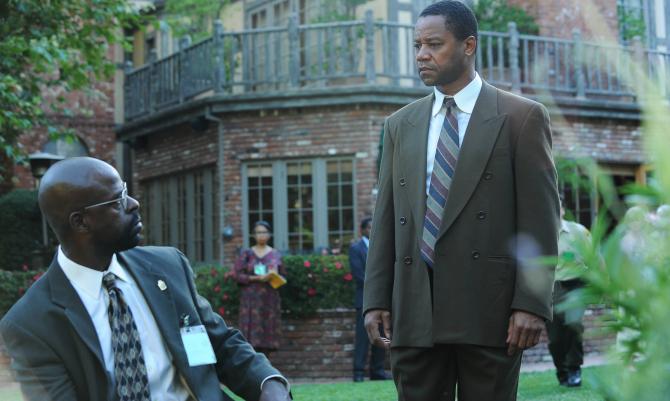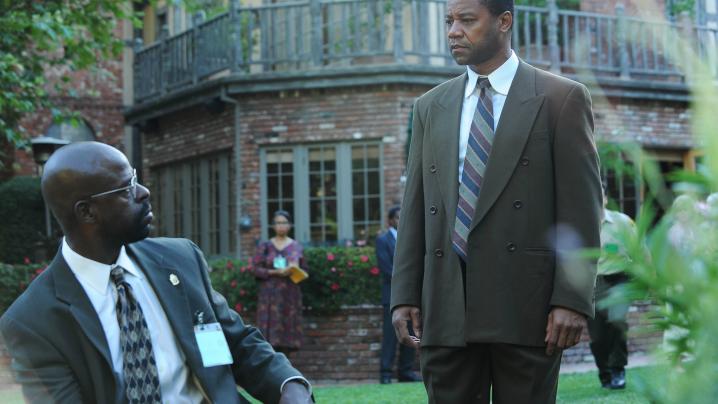[ad_1]

Sterling K. Brown, left, as Christopher Darden and Cuba Gooding Jr. as O.J. Simpson in a scene from The People v. O.J. Simpson
Ray Mickshaw/FX
Johnnie Cochran is driving his daughters to dinner when he’s pulled over by a motorcycle cop for failure to signal while changing lanes, a.k.a. driving a Benz while black. Cochran says it’s the third time this week he’s been pulled over and suggests the officer call in his license before things escalate. Because of his “hostile attitude,” the cop orders Cochran out of the car, puts him handcuffs and leaves him leaning on the hood of his car while he calls in the license. People in this all-white part of town are all staring at Cochran. The officer eventually discovers that Cochran is the assistant district attorney.
Cochran downplays the incident for the sake of his kids but they’re astute. “Daddy, did he call you a ni–er?” the oldest asks.
Cochran: “He didn’t have to.”
He instructs his daughters never to use the n-word.
That was a flashback, because as we know, Cochran is no longer the ADA.
Fast-forward to present day: Cochran is at church, and the pastor is praying for him because Cochran is defending O.J. Simpson and that requires prayer.
After the service, Cochran gives a televised interview and wonders why Christopher Darden is all of a sudden on the case. “It’s obvious Darden is being used as a tool by the DA’s office because he’s black,” Cochran says.
Darden, Marcia Clark and Bill Hodgman are watching the interview at the DA’s office. Darden looks alarmed. You should have listened to your daddy when he told you to stay off this case two episodes ago.
Sometime later, Clark is in a meeting outlining the massive amount of evidence against O.J. “It’s more evidence than I’ve ever seen in a murder case,” Clark surmises. Across town, the defense is unbothered. “Evidence doesn’t win the day, “Cochran says. “Jurors go with the story that makes sense. Our job it to tell that story better than the other side tells theirs.”
At the courthouse on what seems like the following morning, Darden and Cochran meet in the hallway. Darden is upset about what Cochran said in the interview. “My sincere hope is that from this point forward, that we can treat each other with respect,” Darden says. Cochran practically laughs. “Brother, I ain’t trying to be respectful,” he says. “I’m trying to win.” Geez. Darden is so far in over his head. It’s sad, so sad.
In court, Darden nervously asks judge Ito to ban the use of the n-word during the trial. Darden says the n–word will affect the jury’s ability to be fair.
Cochran pipes in to apologize to the African-American population for what Darden said. “I am ashamed that Mr. Darden would allow himself to become an apologist for Mark Fuhrman,” Cochran says. “This was outlandish, unfortunate and unwarranted.” After Cochran wraps, he turns to Darden and says, “n—a, please.”
The next morning, Darden walks into the office looking lost. He’s on the cover story of every major newspaper in the country. There’s even a poll that says 76 percent of African Americans don’t believe he’s doing a good job and often times they refer to Darden as an ‘Uncle Tom.’
That night, Cochran is at home in his robe practicing his open remarks when one of his attorneys, Carl Douglas, calls to say Shapiro’s office didn’t submit all the witnesses into discovery. Douglas suggests Cochran remove the names from his opening statement.
Can’t do it, bruh. Cochran says, “there comes a time when you got to fall on your sword for your client. Tomorrow is your day.”
The following morning, Cochran begins his opening statement with a quote from MLK.
Really? He dragged Martin Luther the Kang into this?
Cochran continues, mentioning the witnesses he knows the prosecution doesn’t know about. Clark and Hodgman look stunned. Hodgman leaps up to tell the judge that the full witness list have not been turned over to the people. Cochran looks baffled.
Douglas takes one for the team as planned and says the Dream Team screwed up. A shrill Hodgman responds, then complains of chest pain before collapsing on the floor.
Bill is taken out on a stretcher and Ito says they should adjourn for the day. Ya think?
At the DA’s office later, Garcetti half-jokes that the building must be cursed. Hodgman’s wife says he’ll be fine but he’s not working the case. Clark says Darden is ready to step up to co-prosecutor.
For some reason I still don’t fully understand, the jury will be touring O.J.’s house. Cochran redecorates the house with African-inspired décor and pictures of O.J.’s mama and kids. Soon thereafter, the jurors are walking through O.J.’s house. In the yard, Clark’s complaining to Ito about O.J.’s home being staged. Darden can’t deal and walks over to take a seat. After O.J. flips on him for sitting on his bench, Cochran approaches Darden to say he shouldn’t question Fuhrman on the stand.
Darden calls his dad freaking out about what Cochran said. He thinks his former mentor is intimidated by him. Ummmm. Nah. Papa Darden reminds his son that he is in charge, so he needs to act like it. Also, “could it be possible he’s just trying to give you some good advice, black man to black man?” I wish Darden would listen to his dad more.
Darden interviews Fuhrman in preparation for the trial. He asks the detective how he feels about interracial couples. “Don’t care,” Fuhrman responds. Does he have any his hobbies? He collects World War II memorabilia, mostly medals. What athletes he likes? “George Foreman and Magic Johnson,” Fuhrman responds. “I’m surprised to hear that,” says Darden. In the past, hasn’t the detective expressed a dislike of African Americans? No. Has he ever targeted African Americans while on the job? No. “Have you ever used a racial slur in describing an African American?” Darden inquires. No. “Oh, you’re saying you’ve never used the n-word?” Of course, Fuhrman firmly denies using the n-word. “I haven’t, ever,” he says.
Afterwards, Darden barges into a meeting Clark is having with other attorneys and announces he’s not putting Fuhrman on the stand. Clark finally agrees to do it herself.
At home, Fuhrman is tending to the aforementioned World War II memorabilia. The camera pans to a medal with a swastika.
[ad_2]





















